Still, to keep business going, he switched to producing hand sanitisers, because it was “peripheral” to what they were already doing, he says.
But the going hasn’t been easy. Raw material prices—for the thickener and alcohol, in particular—have shot up, transportation has been tricky and hand sanitisers have all but become a commodity. “Someone can easily price their product Rs 2 lower than ours. That’s all that matters right now as consumer knowledge about sanitisers isn’t strong,” he says.
Unlike big businesses that have collateral, micro, small and medium enterprises (MSMEs), which contribute 29 percent to India’s GDP and generate close to 11 crore jobs, have been crushed by the coronavirus outbreak. Demand has slipped, cash flows have frozen and employee payrolls are piling up. Yet, many like Thakur are finding creative ways to survive.
“It’s amazing to see the kind of things SMEs are doing,” says N Chandramouli, a brand expert whose clients include several small businesses. “We’re consulting many such businesses right now, and they’re all looking at adapting their business models or launching innovative products.”
Finding new ways
Gauri Devidayal chose to temporarily shutter The Table, her fine-dining restaurant in South Mumbai, a few days before the lockdown was announced. “We just didn’t think it was safe for our customers or our employees,” she says.
But with revenue down to zero, it was hard. So two weeks into the lockdown, she decided to launch a takeaway service from Mag Street Kitchen, the restaurant’s central kitchen, bakery and events space.
The 2,500-sq ft space also has accommodation facilities so convincing employees to return to work was easy, says Devidayal. Not only did they need the income, but most live in cramped chawls where social distancing is near-impossible camping at work was a safer bet. Plus most of them were bored of sitting at home, she adds.![20200428gauridevidayal_017 20200428gauridevidayal_017]() Gauri Devidayal started a takeaway service after she shut her restaurant The Table in Mumba
Gauri Devidayal started a takeaway service after she shut her restaurant The Table in Mumba
With 10 employees working at present—down from 170—the Mag Street Kitchen restarted operations. Baked goods as well as items from its Indian food service Iktara can be ordered via Scootsy, an on-demand delivery app.
“The response has been pretty good so far,” says Devidayal, who expects the lockdown to last through May. Even after, it’s unlikely that people will feel comfortable coming to restaurants for a few months. So she plans to double down on the takeaway service, soon launching the same for items on The Table’s globally-inspired menu as well.
Launching essential products
The pandemic prompted Aryata Agarwal to temporarily pivot her Kolkata-based, family-run cement-bag making business.
As the demand for cement—and therefore the bags used to store it—plummeted, Agarwal was quick to realise a more pressing need that her factory could cater to. “There’s no dearth of demand for essential goods. So we had to be innovative about using our existing resources to produce what was needed... bags used to store grains and other dry rations,” she says.
But food grains often need to be stored for longer than cement, so the bags need to have a longer life span, especially under direct sunlight since they’re often kept in open fields, explains Agarwal. So, using the same raw materials as cement bags, her team “rejigged the input composition marginally” by adding a UV additive.
Production took off soon and even though there are entrenched food-bag manufacturers in the market, Agarwal has been able to find willing buyers and importantly, keep the tills ringing.![20200427himanshuaggarwal_011 20200427himanshuaggarwal_011]() Himanshu Aggarwal"s Suman Traders made lab-testing equipment, but switched to producing PPEs. However, government guidelines have resulted in him facing significant losses
Himanshu Aggarwal"s Suman Traders made lab-testing equipment, but switched to producing PPEs. However, government guidelines have resulted in him facing significant losses
Similarly, Thakur who runs two hotels in Himachal Pradesh in addition to his manufacturing plants, had to rework his offering. Hotel bookings have dried up, especially in Shimla, a tourist hotspot, where one of his properties is located. The other hotel, located in the industrial town of Parwanu, has been able to cater to companies who want to restart their factories but as per government guidelines must house their staff close by. “We’re now offering them long term leases,” says Thakur, “so it’s somewhat redeeming.”
Keep customers engaged
With the ban on liquor sales, India’s first craft gin brand, Greater Than, has been a direct casualty. Even so, Anand Virmani, co-founder of Nao Spirits, the company behind the gin, says the blow hasn’t been that bad. “Our payment cycles [from bars and retailers who sell their gin] are anyway 60 to 90 days long, so we have the cash flow to keep going,” he says. The problem, he points out, is that he’s not sure his regular customers have enough gin stocked up at home.
To ensure brand recall and customer engagement, Virmani has launched 2-minute do-it-yourself cocktail-making tutorials on Instagram. Gin, obviously, is the base for all the cocktails. “Greater Gin is an essential of course,” notes the caption to every video. “Even if people use another brand of gin, it’s okay,” says Virmani. “The idea is to engage our community with good quality content.![1 1]() Aryata Agarwal"s family business has repurposed the cement-bags they manufacture for storing food grains
Aryata Agarwal"s family business has repurposed the cement-bags they manufacture for storing food grains
Since bars and restaurants comprise 40 percent of Greater Than’s sales, Virmani doesn’t see business picking up for another six months post-lockdown—unless a “miraculous vaccine” is developed. In the meantime, Virmani and team are using the time to rethink their strategy. “We started what we call ‘Nao Upstream’ where we bring together our team and some experts [over Zoom] and ask ourselves difficult questions like, ‘How can we make the best sales pitch of our life?’, ‘What can we do differently?’ It’s all about internal learning, which we usually don’t get the time to do,” he says.
Several businesses have been using Facebook’s tools during this time, says Archana Vohra, director, small and medium businesses at Facebook India. “Instagram live views have increased 60 percent in the last week,” she says, adding that the social media giant has launched a slew of measures including a ‘business resource hub’ to guide SMEs on the immediate actions they should take to navigate the present challenges.
Revive an old idea
Prior to the lockdown, RaseedBook, a billing and record keeping service for local businesses, generated 800 to 1,000 bills a day from its 5,000 merchant-customers across 125 cities. Post the lockdown, business dipped so much that the Gurugram-based startup just about generated 20 bills a day.
“We realised we needed to offer an online ordering and delivery service,” says Vivek Kumar, co-founder and CEO. An IIM-Indore alumnus, Kumar had launched Alluzo, while pursuing his degree, to help students order groceries from nearby kirana stores. One of the learnings from running the startup was that small, neighbourhood stores were just not equipped to deal with online orders. They struggled with inventory management, book keeping and paper-based billing. Moreover, while the students using Alluzo were tech-savvy, regular customers weren’t in the habit of ordering online from kirana stores. So upon graduation, Kumar withdrew the service and instead launched RaseedBook. “We thought we would first help local stores with the backend and once we have a base of 50,000 merchants using the platform, we would relaunch Alluzo,” says Kumar, referring to his co-founder Ashutosh Pathak, an IIT-Delhi alumnus. ![2 2]() Anand Virmani, co-founder of Greater Than gin, is creating Instagram tutorials on how to make gin-based cocktails at home
Anand Virmani, co-founder of Greater Than gin, is creating Instagram tutorials on how to make gin-based cocktails at home
But the pandemic hit and business stalled. That’s when the duo decided to revive Alluzo sooner rather than later. Customers—now forced to go online—can place orders to grocery stories via the app the stores receive the orders and deliver the goods since most customers live within a 1-2 km radius. RaseedBook, meanwhile, continues to assist store owners with the backend. “Sure, customers can place orders using WhatsApp, but the minute those orders increase from 10 a day to 50 a day, WhatsApp becomes cumbersome for the store owner,” reasons Kumar.
Needless to say business has been booming. In fact, in Jalandhar where the startup has a large customer base, the district collector has allowed Alluzo to not just enable the online purchase of groceries but also medical tests. Requests for urine tests, for example, are relayed to a pathology lab that then fulfils them.
“Difficult times bring out the best business ideas and innovations,” says Sandip Chhettri, COO of TradeIndia.com. The B2B platform that connects SMEs with buyers and suppliers, among other services, has seen companies adapt to the crisis by picking up new and essential lines of production or trading.
Sometimes though, warns Chhettri, business experiments can turn costly. Take for instance Himanshu Aggarwal, proprietor of Suman Traders, a Gurugram-based outfit that makes and trades in instruments and glassware used in laboratories. When demand for his products slipped, Aggarwal decided to outsource production of personal protective equipment (PPE) gowns which he then planned to sell to medical distributors. Quick-footed as he was, he found designs online, sourced the raw materials and started production. After several hundred gowns were made, the government issued a guideline stating that only certified materials must be used in the production of PPEs. “They should have provided all the guidelines from the beginning. This guideline only came a week ago when we are already well into the crisis,” he says.![3 3]() Reji Philip"s travel agency, Cosmos Travels, is looking at large amounts stuck in cash flows since the pandemic has grounded the travel industry
Reji Philip"s travel agency, Cosmos Travels, is looking at large amounts stuck in cash flows since the pandemic has grounded the travel industry
Image: Abel Philip
Aggarwal is now staring at a loss of Rs 20 lakh. “For a small businessman like me, this is a huge amount,” he says. “Plus I don’t know when my regular business will return to normal... all my payments are stuck there too.”
In other instances, there simply isn’t a way out. Reji Phillip of Cosmos Travels is looking at “lakhs and lakhs” of frozen cash flows. The Mumbai-based travel agency mostly caters to corporate clients who pay in 30-day cycles. Phillip made—and paid for—several of their flight bookings which now stand cancelled. But airlines aren’t refunding the money—only deferring the booking to a later date, says Phillip, while customers are demanding full refunds. “I don’t know when flights will restart, and even when they do people will be scared to travel,” he says. Without any government relief measures for him to tap into, Phillip has taken a loan from family and friends to pay his staff. Going forward, he says, he might have to furlough some of them. “The government wants us to keep paying wages, but they are not helping us in any way.”
An interest-free loan given by the government as opposed to a bank where loan applications can often languish for long, would be helpful, say most MSME owners. That, coupled with the agility many of them have displayed, should see them through the crisis.

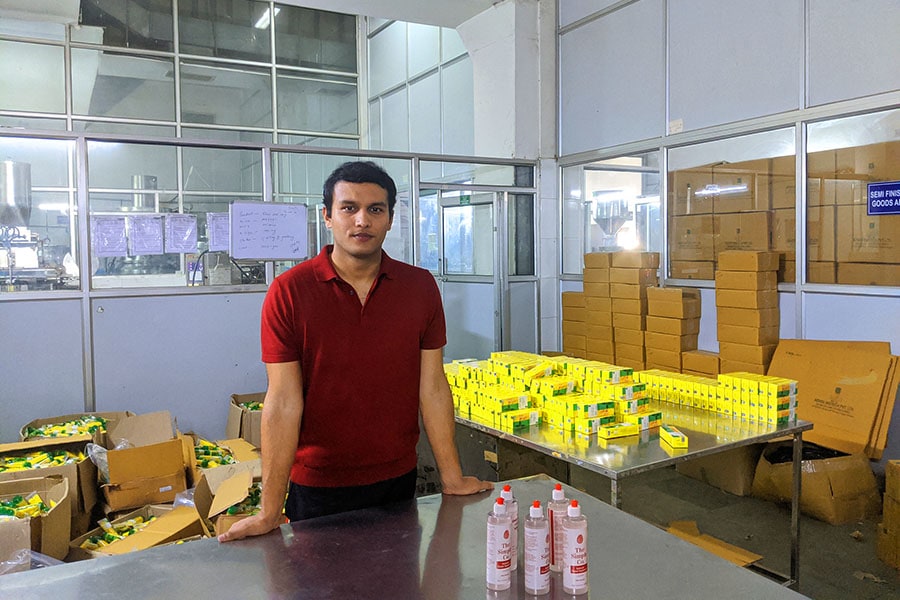 Angad Singh Thakur switched to manufacturing hand sanitisers at his factories in Himachal Pradesh in the wake of the Covid-19 outbreak
Angad Singh Thakur switched to manufacturing hand sanitisers at his factories in Himachal Pradesh in the wake of the Covid-19 outbreak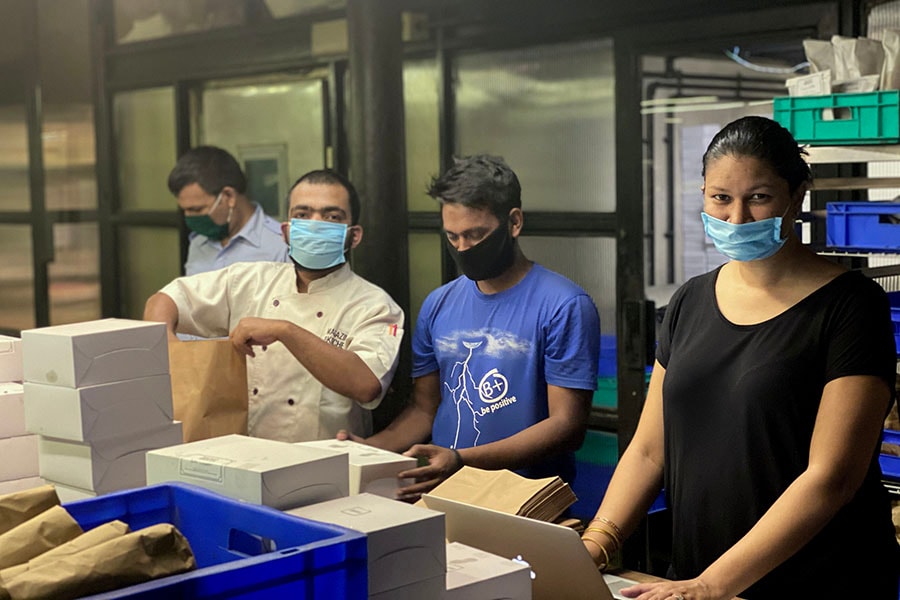 Gauri Devidayal started a takeaway service after she shut her restaurant The Table in Mumba
Gauri Devidayal started a takeaway service after she shut her restaurant The Table in Mumba 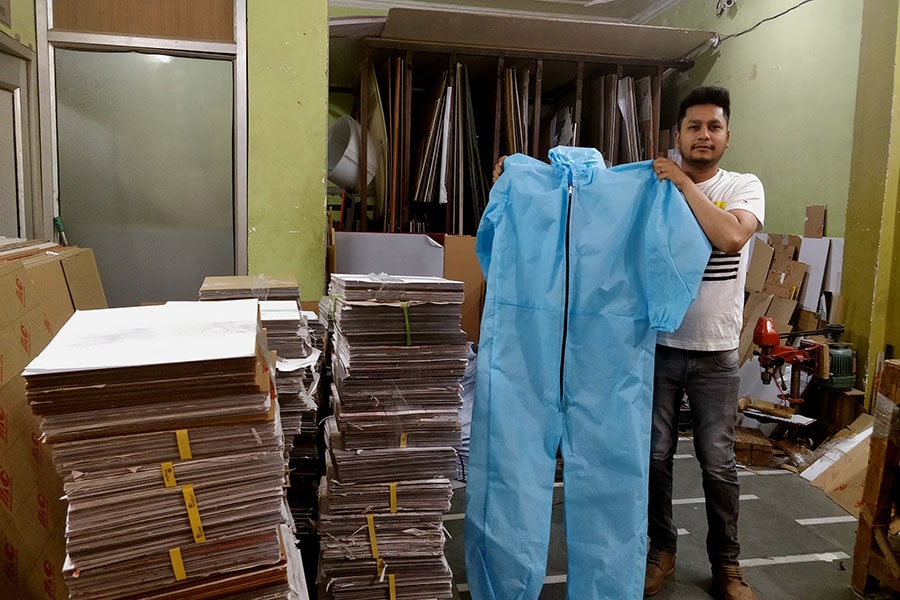 Himanshu Aggarwal"s Suman Traders made lab-testing equipment, but switched to producing PPEs. However, government guidelines have resulted in him facing significant losses
Himanshu Aggarwal"s Suman Traders made lab-testing equipment, but switched to producing PPEs. However, government guidelines have resulted in him facing significant losses Aryata Agarwal"s family business has repurposed the cement-bags they manufacture for storing food grains
Aryata Agarwal"s family business has repurposed the cement-bags they manufacture for storing food grains 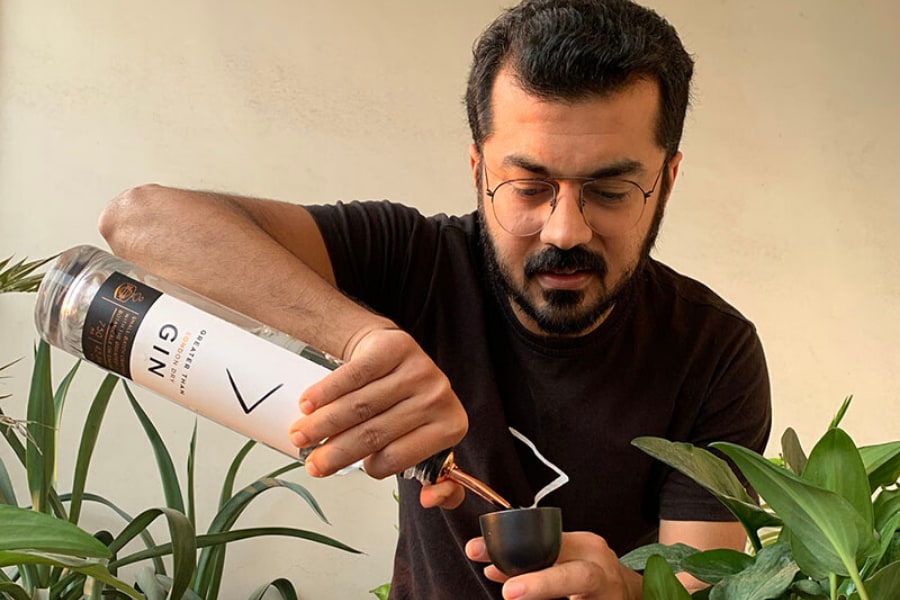 Anand Virmani, co-founder of Greater Than gin, is creating Instagram tutorials on how to make gin-based cocktails at home
Anand Virmani, co-founder of Greater Than gin, is creating Instagram tutorials on how to make gin-based cocktails at home 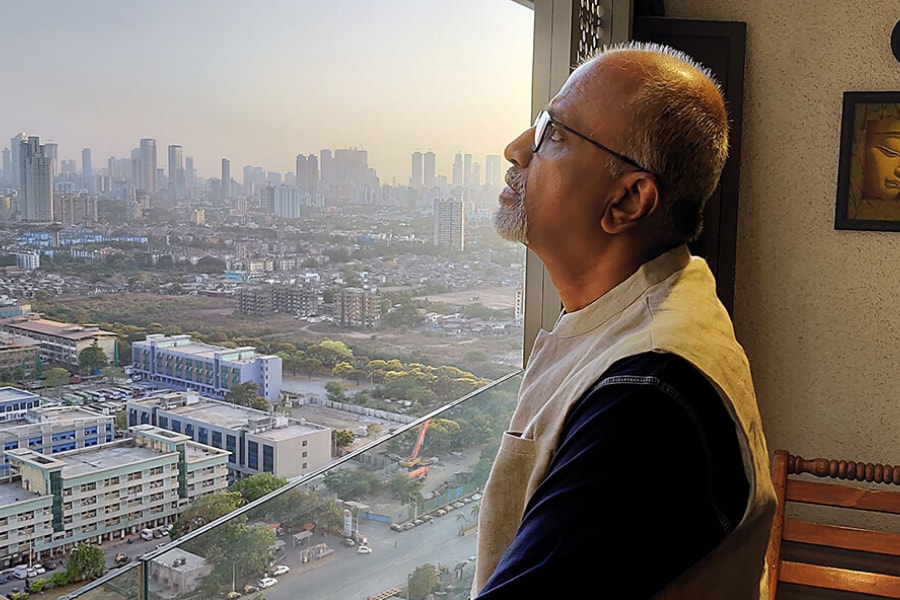 Reji Philip"s travel agency, Cosmos Travels, is looking at large amounts stuck in cash flows since the pandemic has grounded the travel industry
Reji Philip"s travel agency, Cosmos Travels, is looking at large amounts stuck in cash flows since the pandemic has grounded the travel industry